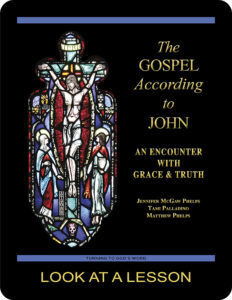synoptic
 For its liturgy, the Catholic Church follows a set schedule of readings called a lectionary. Daily readings are on a two-year cycle alternating
For its liturgy, the Catholic Church follows a set schedule of readings called a lectionary. Daily readings are on a two-year cycle alternating
between years 1 and 2, while Sunday readings are on a three-year cycle alternating between years A, B, and C. Over a period of three years, those attending daily Mass will hear the vast majority of the Bible read.
The focus of the Sunday reading cycle is to go through the Gospels According to Matthew, Mark, and Luke, one per year. The Church separates these Gospel accounts because all three tell much the same story of Jesus’ life and public ministry from a similar point of view. Often these three books are called the synoptic gospels.
The word synoptic comes from Greek roots. It has two parts. The first part, syn, comes from a Greek root that means “with.” The second part, optic, is from the Greek root that means “eye.” These two parts together, then, make up the word synoptic that means “with the same eye” and reflects the idea that the three evangelists take much the same perspective and approach to Jesus’ life.
In contrast to the three synoptic gospels is the Gospel According to John. John takes a significantly different approach to describing the events of Jesus’ life. For that reason, the Gospel According to John is included evenly throughout all three years of the Sunday lectionary cycle.
related topics: Gospel
you also may like our study of the Gospel According to John
 The Gospel According to John: An Encounter with Grace & Truth, a 25-lesson Catholic Bible study with an imprimatur, examines the Fourth Gospel’s view of Jesus Christ as the Son of God, with special emphasis on the institution of the sacraments of the Church as the means by which Christians are purified and made holy. This recently revised study includes maps and additional commentary, and takes a closer look at the way in which Jesus relates to individual men and women. Click on the book’s cover to view a sample lesson.
The Gospel According to John: An Encounter with Grace & Truth, a 25-lesson Catholic Bible study with an imprimatur, examines the Fourth Gospel’s view of Jesus Christ as the Son of God, with special emphasis on the institution of the sacraments of the Church as the means by which Christians are purified and made holy. This recently revised study includes maps and additional commentary, and takes a closer look at the way in which Jesus relates to individual men and women. Click on the book’s cover to view a sample lesson.
 Click on the picture of the statue of Moses with horns (above) to learn more about Lost in Translation. A new entry is archived each Monday. Contact us to receive Lost in Translation by email every week. You may use any of the contact links on our website to ask Matthew a question.
Click on the picture of the statue of Moses with horns (above) to learn more about Lost in Translation. A new entry is archived each Monday. Contact us to receive Lost in Translation by email every week. You may use any of the contact links on our website to ask Matthew a question.
